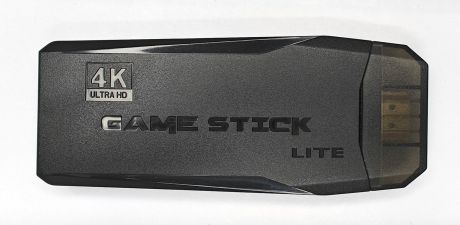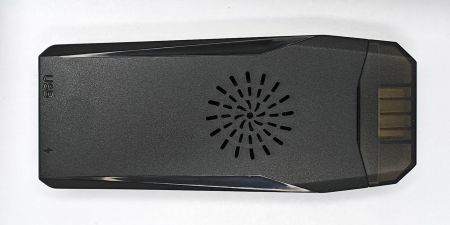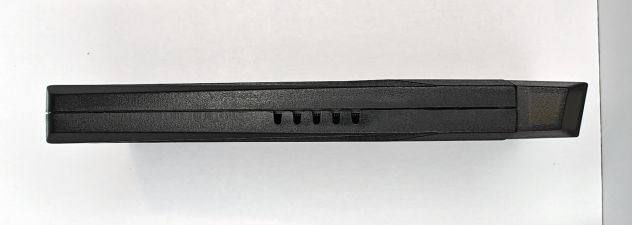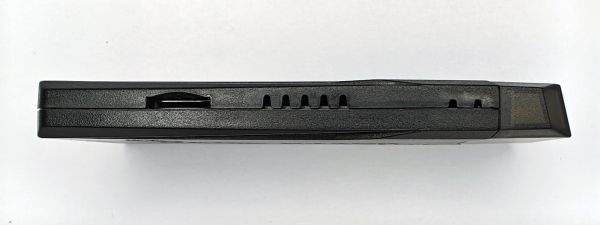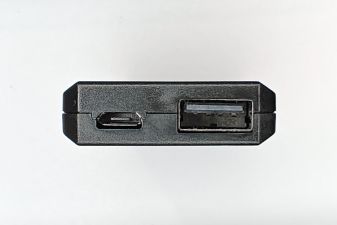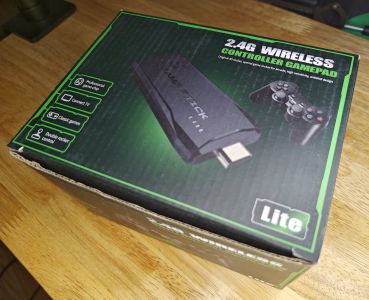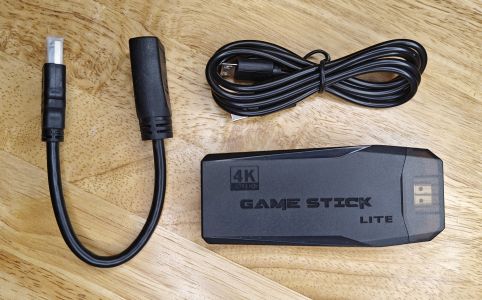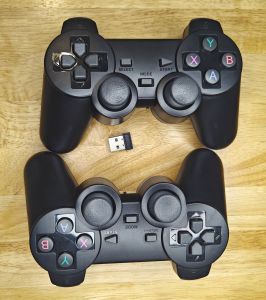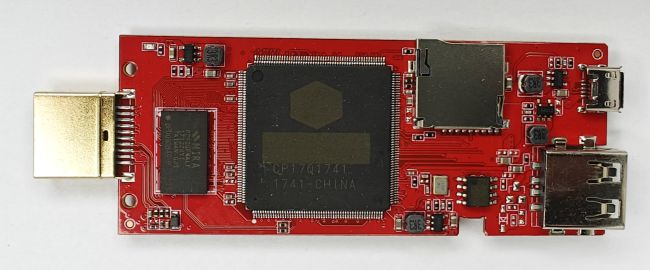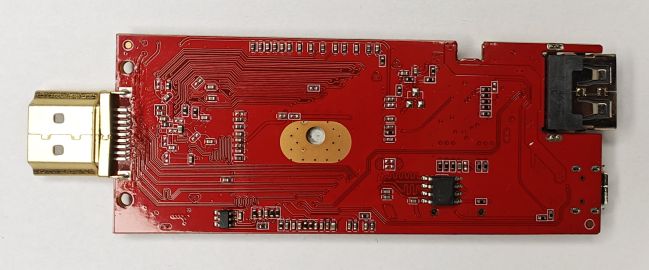Game Stick Lite M8-8001100
| Game Stick Lite M8-8001100 |
|---|
This is a clone of the popular Game Stick Lite model M8 emulator stick, using the HiSilicon Hi3798MV100 SoC[1].
There are many near-identical-looking clones of the M8 using different hardware and software. This one displays "SEGAM-M8-8001100" in the System Information section in the settings menu.
Console
The stick itself appears similar to the original M8 and its many other clones. It has a covered HDMI connector on one end, a Micro USB and full-size USB port on the other and a MicroSD card slot on the side. It also has added ventilation holes over the main SOC and on each side, presumably added because this chip can run quite hot. I'm not sure if the extra holes are unique to this particular type of clone, but at least some earlier versions of it do not seem to have them.[2]
Firmware
All units seem to display firmware v8.0 with different build dates. Reported build dates include: 2024-07-12[3], 2024-07-13[4], 2024-07-21[5], 2024-07-25[2], 2024-08-28[6], 2024-09-19[7], 2024-10-15[8].
It has been reported that sticks that come with the 2024-07 versions are not compatible with the 2024-09/2024-10 versions, and vice versa, but I have multiple units that came with the 2024-08-28 version & they seem to run both the 2024-07-12 and 2024-10-15 versions with no issues, so this is inconclusive for now.
Software quirks
- If you plug in a USB keyboard, pressing Ctrl+Alt+Delete will reset the device. No other key combinations have been observed to do anything so far.
- When using a controller with low battery giving false inputs, I was able to trigger a menu and about box referring to MiniGUI Ver 3.0.12 by pressing Select+Start on the in-game menu. I haven't found a way to trigger this in normal circumstances.
Emulation
Compared to the "original" M8, the emulators here seem to perform better, especially PS1 which runs acceptably in the games I tried. The GBA emulator seems to be mGBA as it can run copy protected Vast Fame games (that means a little bit of code I wrote is in here) (how flattering). There are a bunch of "extra" systems added on top of those supported by the original M8, but these are just increasingly esoteric subdivisions of arcade hardware like "GX" for Konami GX system and "GALAX" for Galaxian hardware. There is no aspect ratio option, and all games run stretched to 16:9. Yes even the portrait-mode arcade games. Have fun
Package & accessories
As standard for most M8 game sticks and clones, it comes with a pair of PS2-style wireless controllers, with a USB dongle to connect them to the stick. These controllers aren't proprietary and are also compatible with PCs and other devices. It also includes an HDMI extender and a Micro USB power (but not data) cable.
Clones using this hardware seem to have shipped with different variants of packaging and controllers; my package lacks the "Game" logo in the upper left & my controllers have the Start/Select/Mode text embossed in the plastic, while the unit seen in DZ4Team's video[2] has the "Game" logo present and the controller text printed in silver.
Considering this and the shell variations (with/without ventilation holes), it's probably not possible to distinguish M8-8001100 units from other M8 clones without checking the menu or the PCB.
PCB
The main SOC has its details sanded off on all known units, but strings in the SD card dump indicate the Hi3798MV100 & it appears to match that chip.[9]
MicroSD card
The included MicroSD card is not normally readable on a PC; it has no partition table and starts with the bootloader for the system. If you use software to "recover" the partitions it will overwrite the bootloader and the device will no longer be able to boot from the card.
Layout according to lucamot's post on Reddit: [10]
| Start | End | Size | Contents |
|---|---|---|---|
| 0 | 0x1FFFFF | 2MB | Bootloader |
| 0x200000 | 0xBFFFFF | 10MB | Linux kernel uImage + DTB |
| 0xC00000 | 0x137FFFFF | 300MB | ext3 partition (rootfs), contains binaries and resources |
| 0x13800000 | 0x177FFFFF | 64MB | ext3 partition, contains game list DB |
| 0x17800000 | 0x377FFFFF | 512MB | swap partition |
| 0x37800000 | 0x777FFFFF | 1GB | FAT partition for download section, user-accessible |
| 0x77800000 | end | varies | FAT partition containing preloaded games |
The cards seem to come in 3 basic sizes, 16GB, 32GB and 64GB, but apparently 16GB cards have been falsely sold as 64GB.
The cards supplied with the 64GB units I have are just labelled "64 HT", they seem to be notably poor quality & most of them give bad reads in numerous sectors. They are more-or-less true 64GB cards, but report lower-than-normal sizes with most of my 64GB cards reporting 53.7 GB (or a suspiciously round 55,000 MB), and one of them reporting only 48.8GB (50,000 MB). I assume the reduction in space was done to avoid even more bad sectors... in any case, the capacity reduction doesn't result in any loss of data, as the final partition (containing the preloaded games) isn't close to being full.
Customisation
Adding games (the intended way)
It is possible to add games into the "download" section of the menu by connecting the stick to a computer via USB, with the MicroSD card inserted into the stick, after a few seconds it mounts a 1GB partition as a regular mass storage drive where you can add your own games. On the stock cards I have, most of this space is already taken up with a preloaded copy of Tekken 3.
Note - The USB cable supplied with the device will not work for this! It is a power cable only and does not support data transmission. You will need to provide your own MicroUSB data cable to access this functionality.[2]
Customising the preloaded game set
Generally this requires you to mount the main games partition, add/remove/edit your games, and rebuild the DB file in order to update the game list in the menu.
Instructions (Russian): https://4pda.to/forum/index.php?showtopic=1081042&st=560#entry132762477
Custom firmware
A Retroarch-based custom firmware called GStickOS has been developed by lucamot: https://lucamot.github.io/GStickOS/index.html
References
- ↑ Hi3798M V100 Brief Data Sheet
- ↑ 2.0 2.1 2.2 2.3 DZ4Team - Flash & ADD Games to M8-8001100 V8.0 4k Game Stick Lite
- ↑ Internet Archive - SEGAM M8 8001 100 V8.0 20240712 Game Stick 4k Lite (32GB)
- ↑ OpenWorld - [v800] SEGAM-M8-8001100_v8.0 2024-07-25 (64GB) - Reply by ruDronga
- ↑ 4pda - Game Stick Lite v4/v20/v5/v7/v7.x/v9.0/m15 - Обсуждение Reply by --Cash--
- ↑ Internet Archive - Game Stick Lite 4K SEGAM-M8-8001100 V8.0 2024-08-28 64GB SD card image
- ↑ OpenWorld - [v800] SEGAM-M8-8001100 V8.0 2024-10-15 (64GB) Reply confirming that 2024-10-15 build runs on a stick that came with 2024-09-19
- ↑ OpenWorld - [v800] SEGAM-M8-8001100 V8.0 2024-10-15 (64GB)
- ↑ [海思经验分享] 海思hi3798系列盒子U盘启动openwrt系统,功能丰富,自行适用。
- ↑ Game Stick 4K Lite - trying to build a custom firmware

